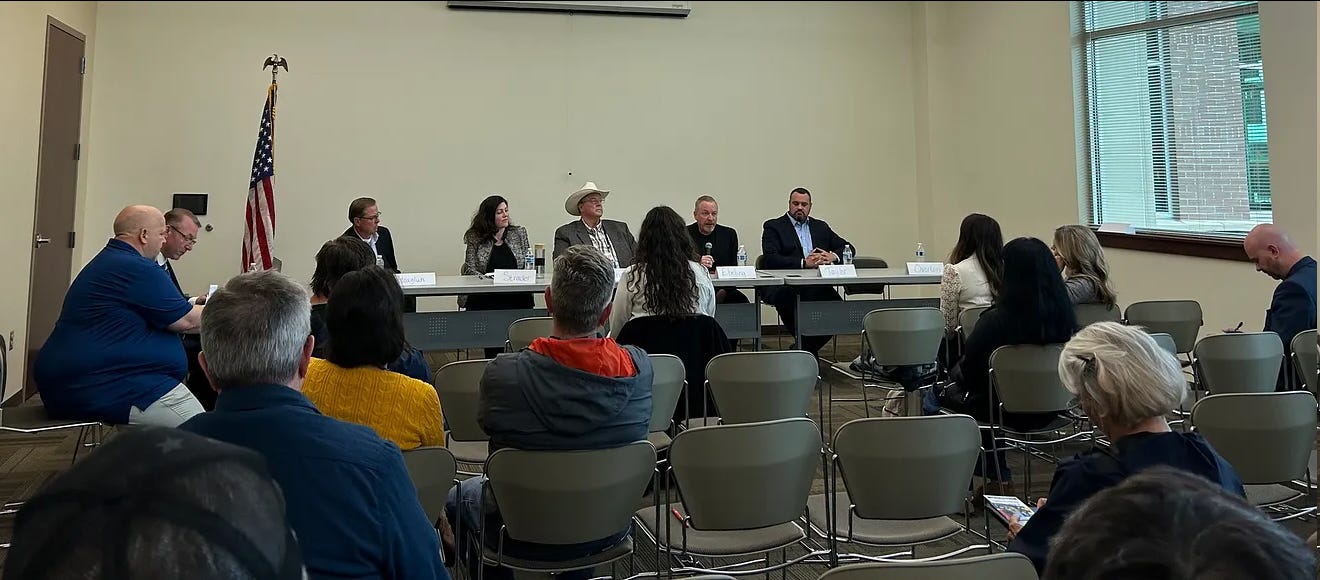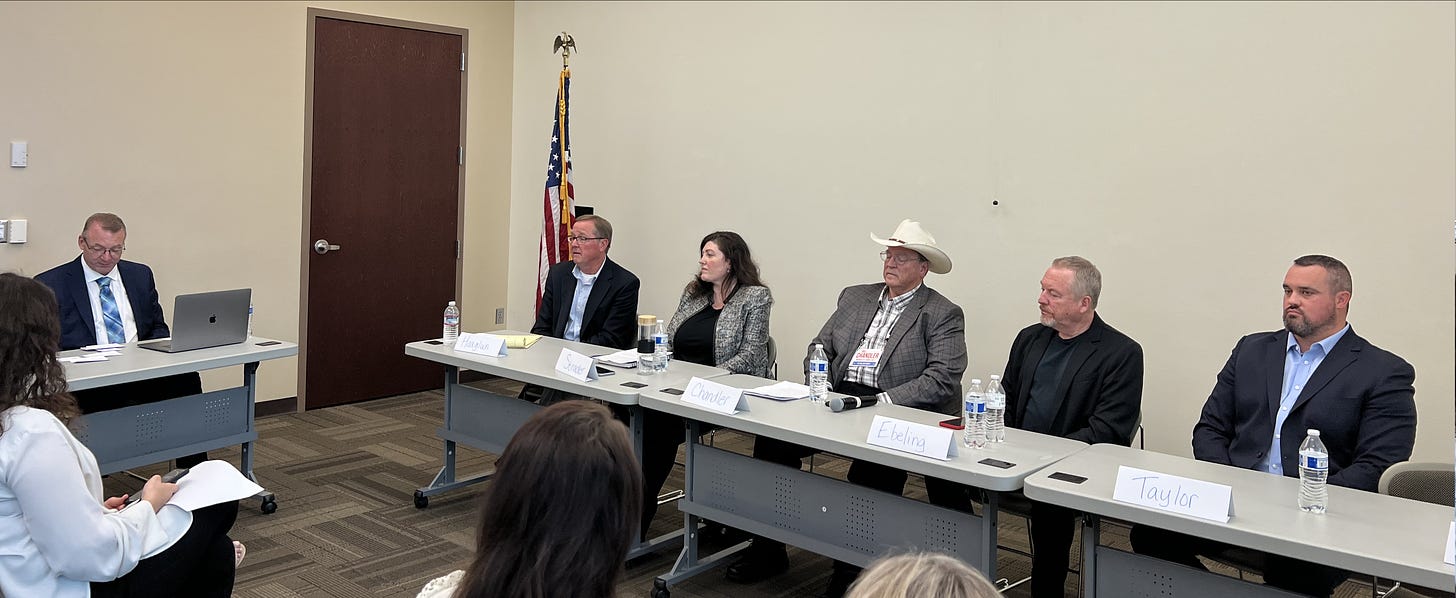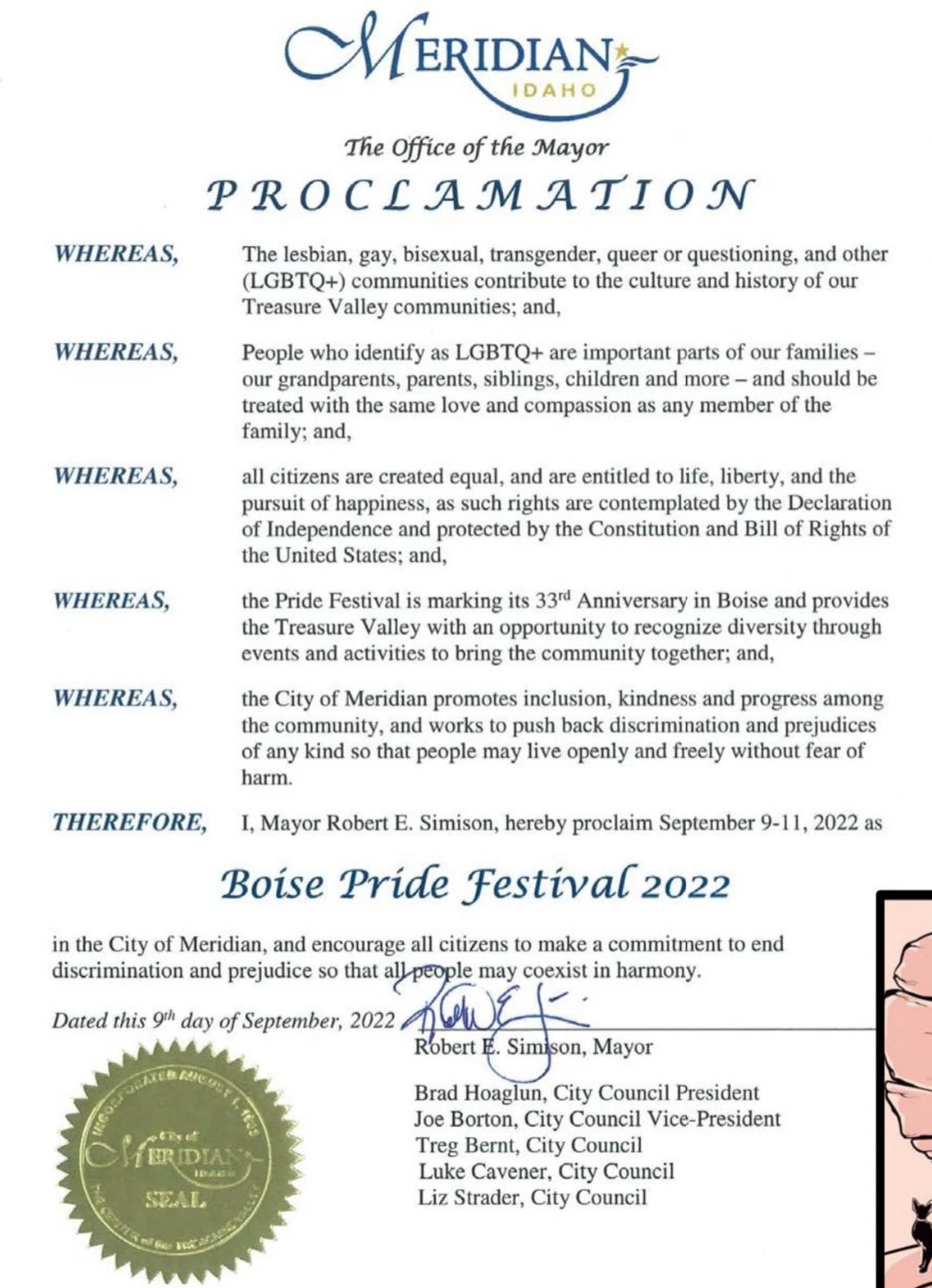This post is now unlocked for free subscribers. Thank you for your support!
The city of Meridian was established in the late 19th century after the Settlers Irrigation Ditch enabled productive farming. Early settlers called it “Meridian” because it was located on the Boise Meridian, one of the 35 principle meridians established in the United States for surveying purposes. One could say, then, that Meridian is the guideline for all of Idaho.
With Boise having gone full speed to the left, to the point where the pride flag now flies over city hall, political eyes have turned toward Meridian. Idaho’s second largest city sits on the brink: will it follow the same path as Boise, in the direction of failed cities like Portland, Seattle, and San Francisco? Or will its citizens find a way to maintain traditional, conservative, American values?
With that in mind, I attended a candidate forum hosted by the Republican Party of Meridian on Tuesday night.
Incumbents Brad Hoaglun and Liz Strader are running against each because of a law that says cities over 100,000 people must elect council members by district. Bill Chandler and Doug Taylor are running for an open seat, and Todd Ebeling and and Anne Little-Roberts are running for another. John Overton, who was appointed to fill Treg Bernt’s seat when he was elected to the Senate, is unopposed.
All candidates except for Little-Roberts participated in the forum. Overton briefly spoke at the beginning but stepped back to allow candidates in contested races time to share their visions.

More than thirty people filled the conference room at Meridian City Hall. The moderators took written questions from the crowd and asked each candidate to give one-minute answers. To be honest, they were on the same page regarding most issues. I often struggled to find daylight between them. I counted at least three times where Strader followed Hoaglun by saying “I agree with Brad.”
That leaves three considerations for voters:
Who will be most effective at implementing a conservative vision
Who is being more honest about their positions?
What do they believe on the margins?
The candidates discussed a wide range of issues, from growth and traffic to Covid lockdowns and library books. Growth was the biggest issue, as Meridian has seen a massive population increase in the last decade. Each discussed his or her ideas for managing that growth by expanding police and fire protection, working with the Ada County Highway District (ACHD) to manage traffic, and maintaining a unique environment where Meridian stays Meridian, rather than growing into Boise.
Nearly every candidate said that traffic was the biggest issue facing Meridian residents. I am told that Ada County is the only place in the entire country where a county-level agency controls the roads, rather than allowing cities to manage their own. Opinions amongst the candidates ranged from Hoaglun and Ebeling desiring a closer partnership with ACHD so as to get the best outcome possible to Taylor suggesting that Meridian needs to be able to control its own traffic rather than outsourcing it to the county.
This being sponsored by the Republican Party, each candidate was asked about their GOP bona fides:
Brad Hoaglun explained that he had worked for Dirk Kempthorne many years ago, and also served as a Republican precinct committeeman and was the chairman of Region IV.
Liz Strader extolled the Republican philosophy of governance, and shared that she was a delegate to the state convention.
Bill Chandler explained that he won’t affiliate as Republican, because he aims to represent all Meridian residents, but he does vote Republican.
Todd Ebeling shared his backstory as a precinct committeeman in the Oregon GOP, where he helped get some conservative neighbors elected to the Legislature.
Finally, Doug Taylor’s resume includes time as a Republican PC, the Ada County state youth committeeperson, the Idaho GOP finance chair, as well as serving as chief of staff for then-Congressman Raúl Labrador.
The candidates were also asked their opinion on the jungle primary / ranked choice voting initiative. All were opposed to varying degrees:
Hoaglun was somewhat noncommittal. “I don’t think we need that here in Idaho,” he said, but he added that it would ultimately be up to the voters to decide.
Strader said that ranked choice voting would be “a total disaster”.
Chandler said he not only opposed ranked choice voting, but favored a return to paper ballots. (We do use paper ballots in Ada County, but they are counted by machines.)
Ebeling called ranked choice voting “the ultimate hijack.”
Taylor went even further, saying that “ranked choice voting is the greatest threat to the Republican Party.”
The candidates were asked about the issue of obscene materials in Meridian libraries. This has been a major point of contention for several years now, culminating in the effort this year to dissolve the Meridian Library Board and bring it under city auspices. The effort failed, and subsequent challengers for seats on the library board were soundly defeated earlier this year. Residents of Meridian clearly believe that the problem of obscene materials in their libraries has been exaggerated for political purposes. So what did the candidates say?
Hoaglun said that as a grandfather, he has become more concerned with inappropriate materials. He believes they should not be accessible to children.
Strader, in her most passionate answer of the night, said that she is an outspoken supporter of the library system. She urged concerned parents to use the existing challenge process to move books they deem inappropriate to the adult section.
Chandler urged the Legislature to act on obscene materials in the library (H314 passed last session but was vetoed by Governor Little). He also said that he did not believe the library should be an independent taxing district.
Ebeling said that obscene materials should be locked up and put on high shelves away from children.
Taylor said he was concerned about inappropriate materials, and wanted to see a better process for determining where books are placed in the library.
Of course, as multiple candidates pointed out, the Meridian Library District is independent of the city, so all council members can do is suggest changes, without any power to enforce them. Also, an issue that none of the five addressed is who decides what is inappropriate? Many leftists want children to be exposed to books that explain LGBTQ+ sexual practices in great detail, while some Republicans pretend such things are not accessible after all. There is a deeper cultural discussion that must happen before any regulation or legislation can be effective.

The candidates were asked if they would support locking down citizens and closing businesses in the case of another pandemic. It seems that everyone who was resolute in exercising extreme powers in 2020 disclaims any responsibility today. Governor Little, for example, issues a “stay at home order” on March 25, 2020, but later bragged that he absolutely did not shut down the state. The sitting council members, Hoaglun and Strader, had the same perspective, while the newcomers expressed frustration:
Hoaglun claimed that Meridian did not restrict businesses, and said they had been concerned about how to keep city employees safe while maintaining services.
Strader said she appreciated the “voluntary” initiatives for businesses and citizens.
Chandler said that he was told to close his business, and lamented that the sheriff did not step in to protect people like him. “It’s not the role of government to tell you what to do,” he said.
Ebeling called the whole thing a “scamdemic”.
Taylor said that he nearly lost his own business and was forced to take a government loan to stay open. He said that the lack of standing up for the little guy was effectively a shutdown, and wants to see politicians stand up for people, rather than grinding them down.
Unfortunately, nobody brought up Sara Brady, the “Meridian Park Mom” who was arrested for taking her children to Kleiner Park when the city had ordered it closed. Not only that, but the city continued to persecute her for more than two years, a process which cost her tens of thousands of dollars. When Attorney General Raúl Labrador finally moved to drop the charges, Meridian Mayor Robert Simison expressed his disappointment. It seemed to me that he and the prosecutors wanted to make an example of someone who dared defy the lockdown orders issued by City Hall, and people like that are dangerous to have in positions of authority.
Another controversial question asked of the candidates was regarding a sexual orientation / gender identity ordinance passed in 2018. This ordinance was the result of a long campaign by LGBTQ+ activists to “add the words” sexual orientation and gender identity to nondiscrimination laws. Current Meridian city councilman Luke Cavener voted in favor of the ordinance, as did former council member and current candidate Anne Little-Roberts, while then-city councilman and current state senator Treg Bernt voted against, saying he wanted to see it handled at the state level instead. What do the current candidates think?
Brad Hoaglun said he doesn’t believe there was a need for such an ordinance, and says he has not heard of any complaints under the ordinance in the past five years.
Liz Strader said she would not necessarily have voted in favor of it, but absolutely opposes repealing it, saying that would send the message that Meridian is not welcoming to certain people. She also dismissed concerns that the ordinance would allow men to use the women’s bathroom, but language of the ordinance suggests that those claims might have merit.
Bill Chandler, Todd Ebeling, and Doug Taylor all said they would have opposed the ordinance, and indicated that they would vote to repeal if given the opportunity.
Meridian waded into more LGBTQ+ controversy last year when the mayor and council signed an official proclamation celebrating Boise Pride Fest, even when the event still included a child drag show. The proclamation was signed by current candidates Brad Hoaglun and Liz Strader, as well as current state senator Treg Bernt.
In all, the candidates seemed to be mostly in agreement on the biggest issues of the city. It sounds like they would handle growth and traffic in mostly the same manner. Voters must decide who they believe will best be able to implement their vision: to work with developers to keep density from getting out of hand, to collaborate with ACHD to provide enough room for traffic, and to keep taxes low while maintaining the services residents have come to expect.
It is in the marginal issues — their opinions about exposing children to perversion, how they would handle another pandemic, and what to do about the growing number of militant activists who demand you bake the cake — that you can find daylight between them. It’s one thing to elect someone to decide how many high rise apartments are allowed in what was once farmland, while it is quite another to trust your elected leaders to do the right thing when the next Covid comes around, and moms want to take their children to the park.
Thank you to the Meridian Republicans for putting on this excellent forum. I hope the citizens of that city make good choices that help keep the Treasure Valley safe for conservative families.






Nice analysis, Brian. I believe you put the daylight between these candidates well enough for thoughtful voters to make better choices.
1. Was this forum recorded? If so, can you make the link available.
2. For those interested in the mayor's race, Idaho Speaks interviewed Mike Hon, a conservative who is running against incumbent Robert Simison. https://idahospeaks.com/podcast/mike-hon-running-for-meridian-mayor/
3. I like the strategy of offering paid content that is made available to free subscribers after a week.
Another clearly expressed, easily understood, and refreshingly frank review ... Thanks, Brian.